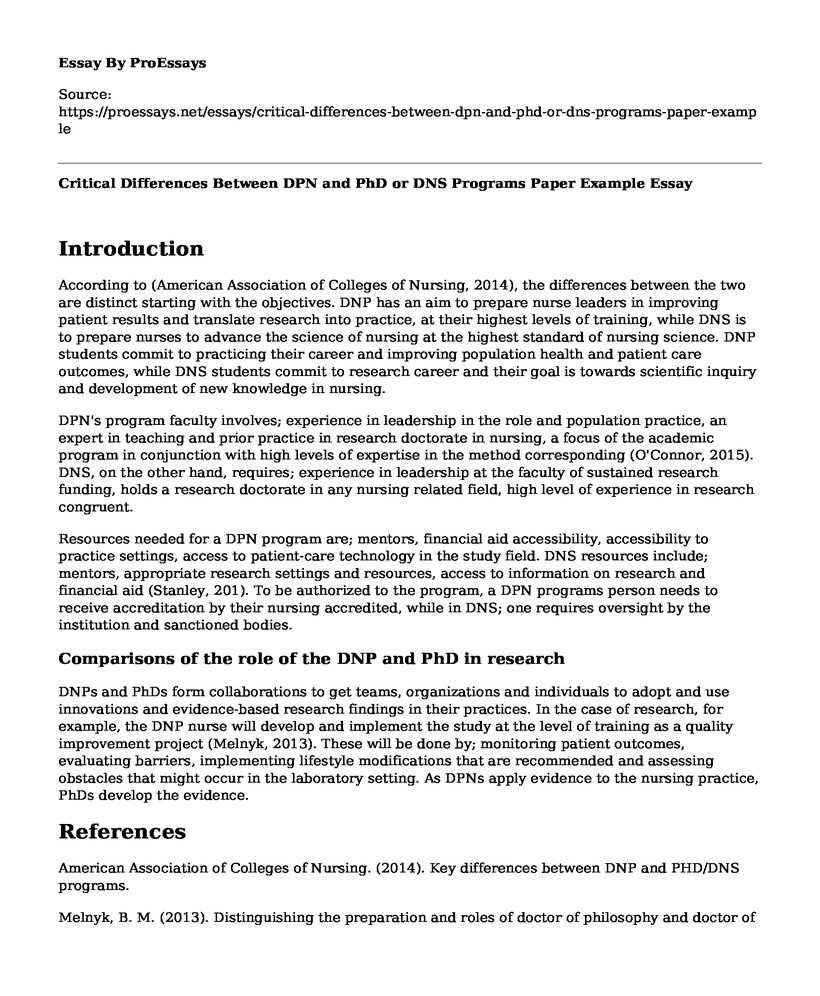Introduction
According to (American Association of Colleges of Nursing, 2014), the differences between the two are distinct starting with the objectives. DNP has an aim to prepare nurse leaders in improving patient results and translate research into practice, at their highest levels of training, while DNS is to prepare nurses to advance the science of nursing at the highest standard of nursing science. DNP students commit to practicing their career and improving population health and patient care outcomes, while DNS students commit to research career and their goal is towards scientific inquiry and development of new knowledge in nursing.
DPN's program faculty involves; experience in leadership in the role and population practice, an expert in teaching and prior practice in research doctorate in nursing, a focus of the academic program in conjunction with high levels of expertise in the method corresponding (O'Connor, 2015). DNS, on the other hand, requires; experience in leadership at the faculty of sustained research funding, holds a research doctorate in any nursing related field, high level of experience in research congruent.
Resources needed for a DPN program are; mentors, financial aid accessibility, accessibility to practice settings, access to patient-care technology in the study field. DNS resources include; mentors, appropriate research settings and resources, access to information on research and financial aid (Stanley, 201). To be authorized to the program, a DPN programs person needs to receive accreditation by their nursing accredited, while in DNS; one requires oversight by the institution and sanctioned bodies.
Comparisons of the role of the DNP and PhD in research
DNPs and PhDs form collaborations to get teams, organizations and individuals to adopt and use innovations and evidence-based research findings in their practices. In the case of research, for example, the DNP nurse will develop and implement the study at the level of training as a quality improvement project (Melnyk, 2013). These will be done by; monitoring patient outcomes, evaluating barriers, implementing lifestyle modifications that are recommended and assessing obstacles that might occur in the laboratory setting. As DPNs apply evidence to the nursing practice, PhDs develop the evidence.
References
American Association of Colleges of Nursing. (2014). Key differences between DNP and PHD/DNS programs.
Melnyk, B. M. (2013). Distinguishing the preparation and roles of doctor of philosophy and doctor of nursing practice graduates: National implications for academic curricula and health care systems. Journal of Nursing Education, 52(8), 442-448.
O'Connor, B. (2015). New White Paper on the Doctor of Nursing Practice: Current Issues and Clarifying Recommendations. Journal of Professional Nursing, 31(5), 378.
Stanley, J. M. (2012). Impact of New Regulatory Standards on Advanced Practice Registered Nursing. Nursing Clinics of North America, 47(2), 241-250.
Cite this page
Critical Differences Between DPN and PhD or DNS Programs Paper Example. (2022, Sep 18). Retrieved from https://proessays.net/essays/critical-differences-between-dpn-and-phd-or-dns-programs-paper-example
If you are the original author of this essay and no longer wish to have it published on the ProEssays website, please click below to request its removal:
- Factors that Form the Learning Gap Between Clinical and Classroom Theories in Saudi Arabia Among Nursing Students
- Black and White Achievement Gap - Sociology Essay Example
- Essay on Lessons from Preschool Observation
- Patient Satisfaction Survey: Data Collection Paper Example
- The Rohingya Community Essay Example
- Essay Example on Prosocial/Antisocial Modeling & Its Impact on Children's Growth
- NONPF Core Competencies - Report Example







